In the rapidly evolving landscape of artificial intelligence and content creation, tools that claim to “humanize” AI-generated text have gained significant attention. One such tool that has made waves in this space is Netus AI.
As the digital world grapples with the increasing prevalence of AI-generated content and the subsequent efforts to detect it, Netus AI positions itself as a solution to make AI-written text indistinguishable from human-authored content. But does it live up to its claims of avoiding AI detection?
Let’s dive deep into what Netus AI is, how it works, and most importantly, whether it’s effective in bypassing AI detection systems.
Understanding Netus AI
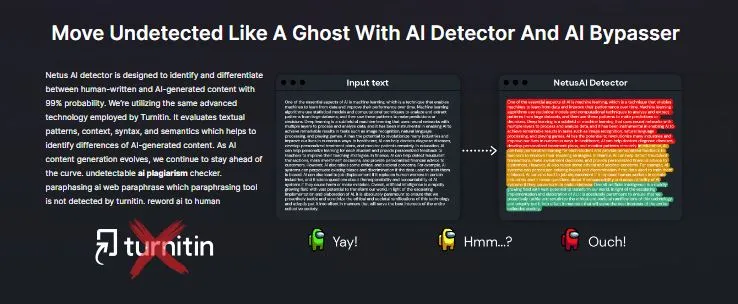
Netus AI is a software service developed by a company of the same name, established in 2023, known for its capabilities in netus ai paraphrasing. With a small team of fewer than 10 members, Netus AI has quickly positioned itself as a niche player in the AI technologies and humanization strategies market. The core offering of Netus AI is its paraphrasing tool, which claims to effectively bypass AI detection tools by rewording AI-generated content to make it sound more human-like.
Key Features of Netus AI:
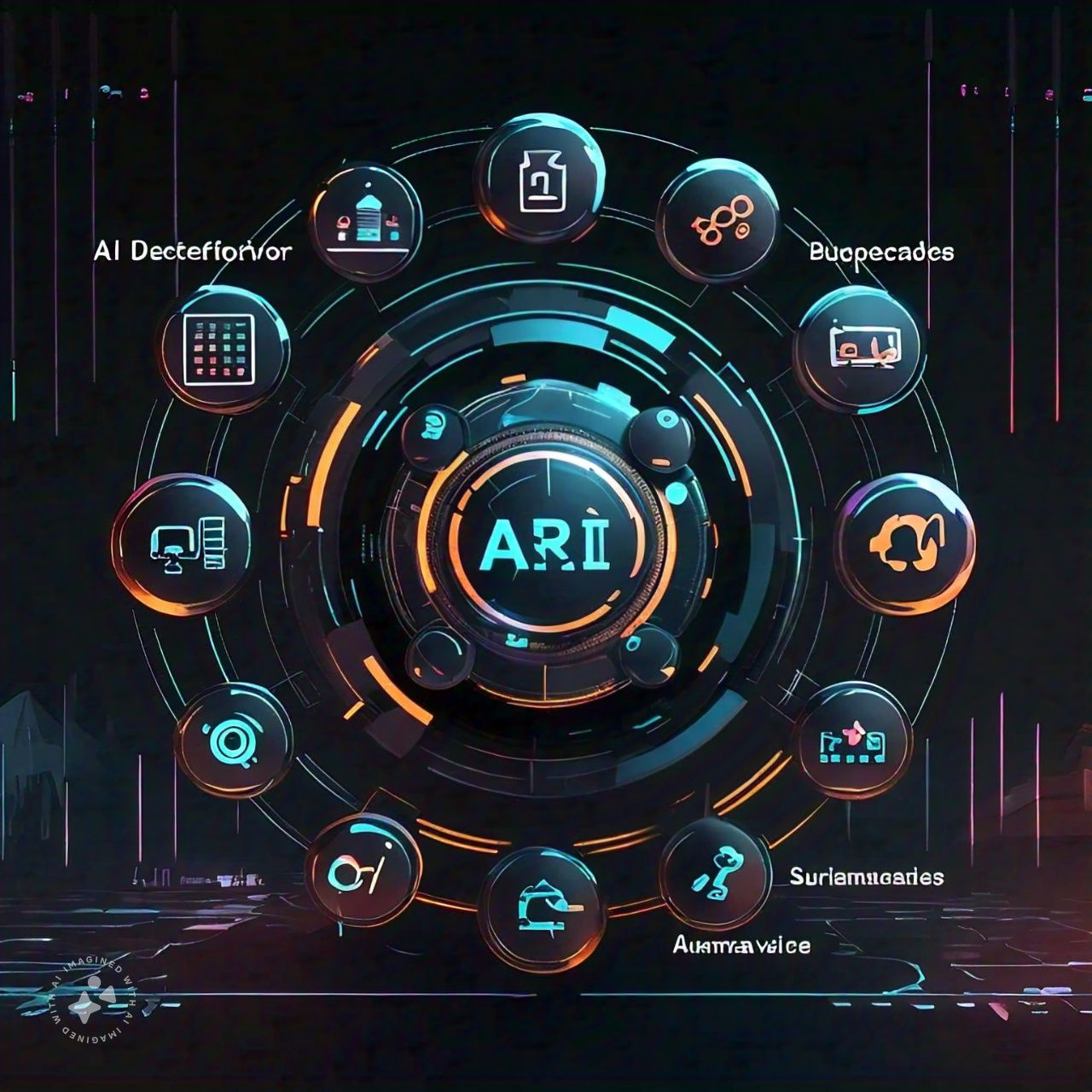
- AI Detector: Netus AI boasts an AI detector with a claimed accuracy rate exceeding 99%, essential for avoiding AI detection.
- Multiple Bypass Modes: The platform offers over 30 bypass modes aimed at converting AI-generated content into human-like text.
- Summarization Tool: A feature designed for quick extraction of crucial information from longer texts.
- User-Friendly Interface: The tool is designed to be accessible and easy to use.
- Swift Generation: Netus AI promises quick content transformation through its paraphrasing model.
- Customization Options: Users can personalize writing styles to suit their needs.
- Additional AI Services: The platform offers access to other AI-related tools and services.
- Free Trial: A limited free trial is available for users to test the service.
The Rising Interest in AI Humanization Tools
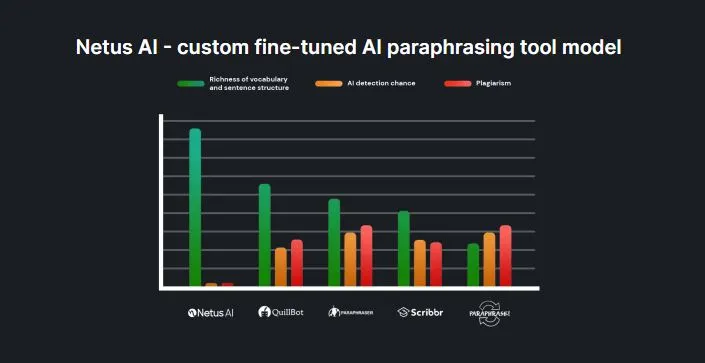
The surge in interest for tools like Netus AI can be attributed to several factors. Since the mainstream breakthrough of ChatGPT in late 2022, there has been a significant increase in AI-generated content online, often transformed by paraphrasing models. However, this rise has been met with pushback from various quarters:
- Search Engine Algorithms: Google and other search engines have begun to prioritize content that is clearly human-written and offers genuine, helpful advice.
- Content Quality Concerns: Many audiences have expressed a preference for human-written content, finding AI-generated text less engaging or valuable.
- Ethical Considerations: There’s an ongoing debate about the ethics of passing off AI-generated content as human-written.
- Academic Integrity: In educational settings, there’s a strong emphasis on preventing the use of AI-generated content in academic work to avoid issues of plagiarism.
These factors have created a market for tools that claim to “humanize” AI text, making it undetectable by AI content detectors. This is where Netus AI and similar tools come into play, promising to bridge the gap between the efficiency of AI content generation and the desired authenticity of human-written text.
Testing Netus AI: Does It Really Work?
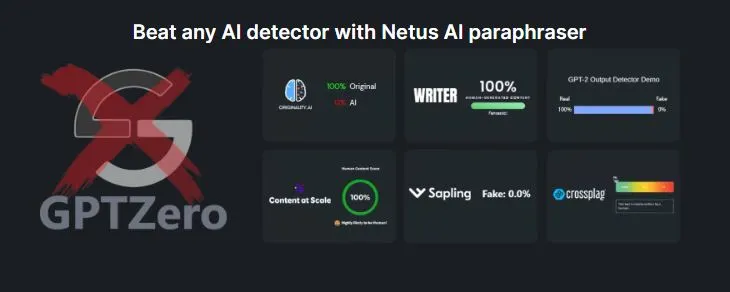
To assess the effectiveness of Netus AI paraphrasing, we need to put it through rigorous testing. The process involves creating AI-generated content, running it through Netus AI for “humanization,” and then subjecting both the original and Netus AI-processed text to various AI detection tools.
For our test, we created a 300-word business-related article using ChatGPT, and then applied netus ai paraphrasing. This original text was then processed through the Netus AI paraphrasing tool. The resulting text was analyzed for changes and then run through three popular AI detection tools: Originality.ai, GPTZero, and Copyleaks.
Results of the Netus AI Test:
Content Analysis:
- The Netus AI version showed subtle discrepancies from the original text.
- Some metaphors and complex descriptions were simplified or omitted by the paraphrasing model.
- The tone shifted from formal to a more casual, blog-style writing.
- While grammatically correct, the essence of the original content was somewhat altered.
AI Detection Results:
- Originality.ai: Detected the Netus AI-processed text as 99% AI-generated.
- GPTZero: Flagged every sentence, indicating the entire content as AI-generated.
- Copyleaks: Identified the text as entirely AI-generated.
These results suggest that despite Netus AI’s claims, its ability to bypass leading AI detection tools is limited at best. The changes made to the text were not sufficient to fool the detection algorithms, and in some cases, the alterations potentially compromised the original intent and quality of the content.
Comparing Netus AI to Alternatives
Given the underwhelming performance of Netus AI in our tests, it’s worth exploring alternative solutions. One such alternative that has shown promise is Humbot, known for its superior paraphrasing and summarization functions.
Humbot: An Advanced AI Writing Tool
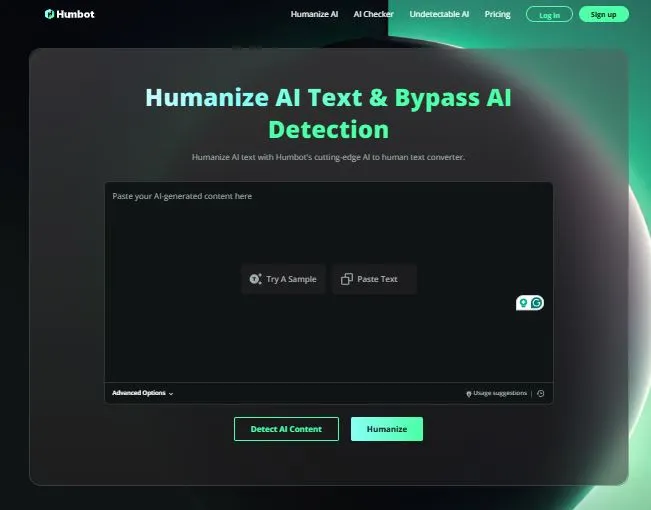
Humbot is positioned as a more sophisticated AI writing tool designed for seamless text humanization. It claims to be capable of processing content from various AI sources like ChatGPT, GPT-4, Bard, and Jasper, and transforming it into undetectable human-like text using advanced ai paraphrasing techniques.
Key Features of Humbot:
- Advanced Humanization Technology: Utilizes cutting-edge techniques to refine AI-generated text.
- Wide Compatibility: Works with content from various AI writer tools, including Netus AI.
- Multiple Bypass Modes: Offers different modes to evade detection by various AI checkers.
- Context Preservation: Aims to maintain the original context and meaning of the text.
- SEO Optimization: Includes features to optimize content for search engines.
- Multilingual Support: Supports over 50 languages, making it a versatile AI writer and paraphrasing function.
- Built-in AI Checker: Allows for immediate verification of the humanized text through the Netus AI detector.
Testing Humbot Against Netus AI
To compare the effectiveness of Humbot with Netus AI, we ran the same ChatGPT-generated text through Humbot and subjected it to the same AI detection tools.
Results of the Humbot Test:
Content Analysis:
- Humbot preserved the original meaning and structure of the text more closely than Netus AI.
- The general layout and key points of the original content were maintained.
AI Detection Results:
- Originality.ai: Scored the Humbot-processed text as 100% original (human-written).
- GPTZero: Classified the text as 96% human writing and 4% mixed writing, with no sentences flagged as AI-generated, in spite of netus ai paraphrasing.
- Copyleaks: Identified the text as human-generated with no AI-written flags.
These results indicate a significant improvement over Netus AI’s performance. Humbot successfully evaded detection by all three AI checkers while maintaining the integrity of the original content.
Implications and Considerations
The comparison between Netus AI and Humbot raises several important points for consideration:
- Effectiveness of AI Humanization: While tools like Netus AI show promise, their effectiveness can vary greatly. More advanced solutions like Humbot seem to offer better results in bypassing AI detection.
- Content Integrity: It’s crucial to consider how these tools affect the original content. Ideally, the humanization process should preserve the intended meaning and quality of the text.
- Ethical Use: The ability to make AI-generated content undetectable raises ethical questions. Users should consider the implications of passing off AI-written text as human-authored, especially in academic or professional contexts where AI detection tools like the Netus AI detector are employed.
- Evolving Detection Methods: As humanization tools become more sophisticated, it’s likely that AI detection methods will also advance. This could lead to an ongoing “arms race” between content humanization and detection technologies.
- Quality vs. Detectability: Users must balance the desire for undetectable content with the need for high-quality, coherent writing that serves its intended purpose.
- Use Cases: While these tools might be useful for certain applications, they should not be seen as a replacement for genuine human creativity and expertise in content creation.
Conclusion: The Future of AI Content and Humanization
As we’ve seen from our analysis of Netus AI and its comparison with alternatives like Humbot, the field of AI content humanization is complex and rapidly evolving. While Netus AI falls short of its claims to make AI-generated content undetectable, more advanced tools like Humbot show greater promise in this area.
However, it’s important to approach these technologies with caution and consideration, especially when using an AI paraphrasing tool. The ability to disguise AI-generated content as human-written raises significant ethical questions and potential issues with content authenticity and quality. As AI continues to play a larger role in content creation, the focus should perhaps be less on “tricking” detection systems and more on leveraging AI as a tool to enhance human creativity and productivity.
For content creators, marketers, and businesses, the key takeaway should be to use AI and humanization tools judiciously. These technologies can be valuable aids in content creation processes, but they should not replace human insight, creativity, and the genuine value that comes from authentic, expert-created content, even when using solutions like Netus AI paraphrasing tool.
As the landscape of AI-generated content and detection technologies continues to evolve, it will be crucial for users to stay informed about the capabilities and limitations of tools like the netus ai paraphraser. The future of content creation likely lies in a balanced approach that combines the efficiency of AI with the irreplaceable qualities of human creativity and expertise, while using AI tools like rephrase functions judiciously.
In the end, while tools like Netus AI and Humbot offer interesting possibilities, they should be seen as part of a larger toolkit in content creation, rather than a complete solution. The most successful content strategies will likely be those that thoughtfully integrate AI capabilities with human creativity, always prioritizing quality, authenticity, and value for the audience.
Frequently Asked Questions
Is Netus AI detected by Turnitin?
Based on our tests and research, Netus AI-processed content is likely to be detected by Turnitin’s AI bypasser. While we didn’t specifically test with Turnitin, the tool’s performance against other AI detectors suggests it may not effectively bypass Turnitin’s checks, even if it acts as a bypasser on other platforms.
Is Netus AI undetectable?
Our tests indicate that Netus AI is not undetectable. Major AI detection tools like Originality.ai, GPTZero, and Copyleaks were able to identify Netus AI-processed content as AI-generated with high accuracy, even though Netus AI is a sophisticated paraphraser.
How much is Netus AI?
Netus AI offers a free starter plan with limited features. For more extensive use, they provide paid subscription plans. However, specific pricing details were not available in our source materials and may vary over time.
Is Netus AI accurate?
While Netus AI can paraphrase content, its accuracy in preserving the original meaning is questionable. Our tests showed that it sometimes alters the tone and simplifies complex ideas, potentially compromising the content’s original intent.
Can Netus AI improve SEO performance?
There’s no clear evidence that Netus AI directly improves SEO performance. While it may help in creating variations of content, search engines prioritize valuable, original content, which may not align with heavily paraphrased or AI-processed text.
How does Netus AI compare to human editing?
Netus AI can quickly paraphrase content, but it lacks the nuanced understanding and creativity of human editors, making it less effective for high-quality content. Human editing typically provides better context preservation, style consistency, and original insights that AI tools like Netus AI paraphrasing struggle to replicate.


